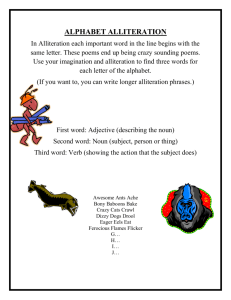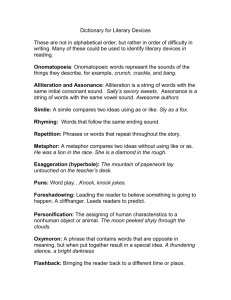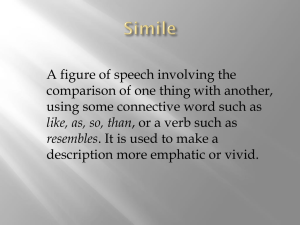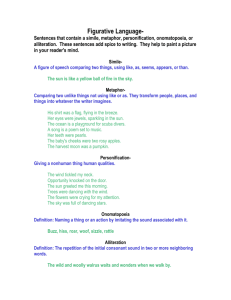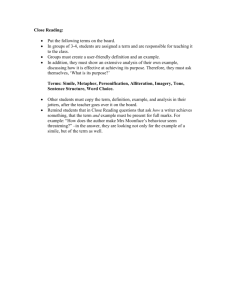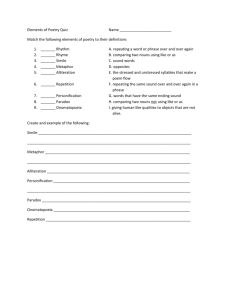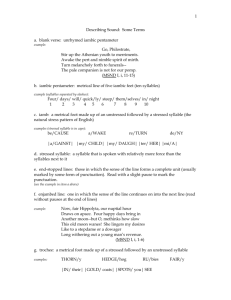L_7_Basic_style_making
advertisement
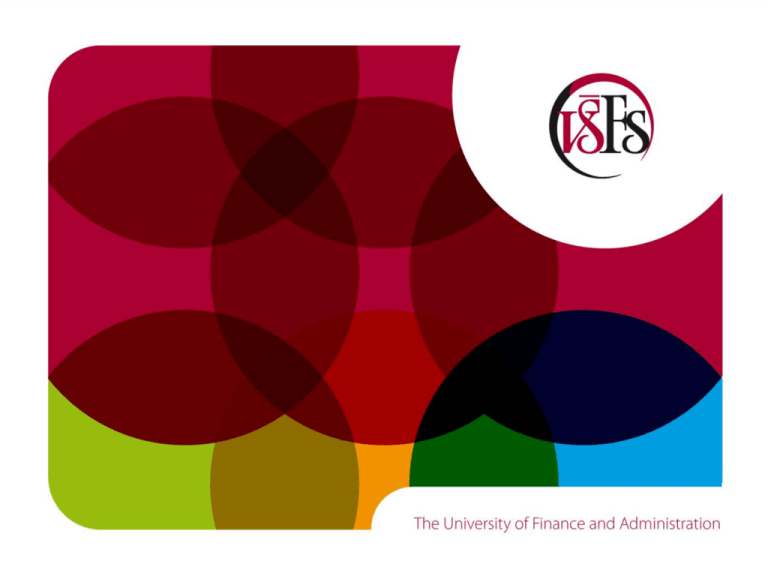
Basic style making recourse of language L7 Ing. J. Šnajdar 2014 Basic style making recourse/ alternative of language Humans use verbal communication to interact with other people. Communication, words alone have no meaning. Only people can put meaning into words. Language reflects social factors such as class, gender and age group. People want their words to be understood, but most times only assume that the recipients have received the message. People also have a tendency to believe that what is important to them as individuals is equally important to everyone else. A speaker, whether involved in an interpersonal conversation or speaking to thousands, must develop effective communication to relate to the audience. Use of power words. An example from the great Winston Churchill: „We have before us an ordeal of the most grievous kind. We have before us many, many long months of struggle and of suffering. You ask, what is our policy? I can say: It is to wage war, by sea, land and air, with all our might and with all the strength that God can give us; to wage war against a monstrous tyranny, never surpassed in the dark, lamentable catalogue of human crime. That is our policy. You ask, what is our aim? I can answer in one word: It is victory, victory at all costs, victory in spite of all terror, victory, however long and hard the road may be; for without victory, there is no survival.“ Use of power words. Each word makes the audience feel something. In this case, Churchill intermixes words that cause fear, such as “struggle,” “tyranny,” and “terror,” with words that cause hope, such as “strength,” “God,” and “victory.” The last, in particular, is repeated over and over, practically drilling the emotion into the minds of the audience. Smart speakers, as well as their speechwriters, sprinkle their speeches with carefully-chosen power words, drawing the audience from one emotion to another as skillfully as any novelist or screenwriter. Granted, that’s not all they do. The best writers use an entire tool chest of techniques to create emotion, and power words are only one such tool. Whenever you need to create curiosity, sprinkle these power words throughout your writing, and readers won’t be able to help being intrigued. Fear is without a doubt the most powerful emotion for grabbing and keeping an audience’s attention. To make sure you don’t change the channel, news networks load up with fear words, making you worry you might miss something important. Catastrophe, Crisis, Death, Disastrous, Hurricane … Terror By using the below power words, you can connect with people’s anger, and slowly but surely, you can work them into a frenzy. Abuse, Arrogant, Bully, Coward, Money-grubbing, Ruthless … Skim through good sales copy, and you’ll find a lot of these power words. Many of them are so overused they’ve become cliché, but that doesn’t stop them from working. Bargain, Best, Cheap, Discount … Reduced They need to trust both you and your product or service. They need to have confidence you’ll deliver. They need to believe they’ll get results. Best-selling, Cancel Anytime, Certified, Endorsed, Guaranteed, … No Risk Words are powerful. In fact, it’s safe to assume that words have the potential to unleash overwhelmingly strong emotions in each and every one of us. They cause us to fall in love, go to war and save the dolphins. They persuade, convince and move us to take unique action. However, you may be shocked to discover that there are only a handful of words that are powerful and compelling enough to move your prospects to action. When it comes to writing ad-copy (whether it’s a webpage, sales page or e-mail), choosing the right words absolutely matters. You can accomplish this best by cherry-picking from proven “power words” that will instantly achieve winning results for your small business. In fact, choosing the right “power words” in your sales copy can uncover hidden profits that you didn’t know existed. When you use quality power words, your prospects will respond to you in a different manner. They will pay attention to you; they will be more involved in your ad-copy; they will stay on your page for a longer period of time. And, of course, they will eventually feel compelled to make a purchase. Verbal Tools Pausing Silence can be golden. Silence can also feel uncomfortable. The pace of a conversation will affects both the emotional and intellectual climate. Frequent well placed pauses contribute to a inductee’s (novice) confidence and capacity. In order to reach higher levels of thinking, the inductee must have time to process. However, for most of us, consciously pausing to provide for space for thinking requires patience and practice. Providing wait time to think and process can be a great gift. Pause to Enhance Thinking and Thought fulness. Paraphrasing Purposeful paraphrasing signals our full attention. It lets the inductee know that we understand his or her thoughts, concerns, questions, and ideas, or we are trying to. By showing we are listening, we earn permission to inquire for details and press for elaboration. Questions may often be interpreted as interrogation. Paraphrasing helps establish a safe environment and trigger more thoughtful responses than simply asking questions alone. Paraphrasing should not slip to the low level of “parrot phrasing.” Three Types of Paraphrases Acknowledge and Clarify, Summarize and Organize , Shifting Levels of Abstraction Posing Questions Skillful mentors are purposeful in their use of questions. The intention of inquiry is to support a colleague in exploring issues, problems, concerns, and ideas. Our verbal and non verbal actions during questioning will impact the effectiveness of the activity. Questioning needs to provide the opportunity for open thinking, multiple responses, and a collaborative approach. Questions should take the thinking to a deeper level without intimidation. An Invitation to Engage and Think, Question Types : Clarifying, Mediational: hypothesize what might happen, analyze, imagine possibilities, compare/ contrast What’s another way you might….What would it look like it…. how was (this) different from (that)… What do you think… Positive Suppositions Assuming that others’ intentions are positive encourages honest conversations. The environment for dialogue and discussion becomes safer and allows us to deeper our understanding of issues. Frustrated Speaker: I never know what to expect when I come to work in the morning. My neighbor knows more than I do and she doesn’t even work here. Respondent: As you think about how we communi cate at our school, what might be some important components for us to implement to help you better gain the information you need? Accent (phonetics), prominence given to a particular syllable in a word, or a word in a phrase. Stress (linguistics), dynamic prominence. Pitch accent, tonal prominence Accent is the phonetic prominence given to a particular syllable in a word, or to a particular word within a phrase. When this prominence is produced through greater dynamic force, typically signaled by a combination of amplitude (volume), syllable or vowel length, full articulation of the vowel, and a non-distinctive change in pitch, the result is called stress accent, dynamic accent, or simply stress; when it is produced through pitch alone, it is called pitch accent; and when it is produced through length alone it is called quantitative accent. A prominent syllable or word is said to be accented or tonic; the latter term does not imply that it carries phonemic tone. Other syllables or words are said to be unaccented or atonic. Syllables are frequently said to be in pretonic or post-tonic position; certain phonological rules apply specifically to such positions. A metaphor is a figure of speech that describes a subject by asserting that it is, on some point of comparison, the same as another otherwise unrelated object. Metaphor is a type of analogy and is closely related to other rhetorical figures of speech that achieve their effects via association, comparison or resemblance including allegory, hyperbole, and simile. In simpler terms, a metaphor compares two objects or things without using the words "like" or "as". You may have often heard expressions such as “he drowned in a sea of grief” or “she is fishing in troubled waters,” or “success is a bastard as it has many fathers, and failure is an orphan, with no takers.” All these expressions have one thing in common: a situation is compared to a real thing, although the situation is not actually that particular thing. Time is a thief - Time isn't really stealing anything, this metaphor just indicates that time passes quickly and our lives pass us by. Bubbly personality - A bubbly personality doesn't mean a person is bubbling over with anything, just that the person is cheerful. Rollercoaster of emotions - A rollercoaster of emotions doesn't exist anywhere, so when people are on a rollercoaster of emotions, they are simply experiencing lots of ups and downs. All of these expressions are examples of metaphors. They are juxtaposing an actual (literal) thing and a figurative thing in order to give more meaning to the figurative concept. To use the above examples, the literal expression in the phrase is “sea,” while “grief” is the figurative item. Expressions are used to give effect to a statement. Imagine how bland a statement such as “he was sad” is, compared to a statement describing a “sea of grief.” The metaphor is sure to give the reader a better idea of the depths of grief in this situation. Alliteration In language, alliteration is the repetition of a particular sound in the prominent lifts (or stressed syllables) of a series of words or phrases. Alliteration has developed largely through poetry, in which it more narrowly refers to the repetition of a consonant in any syllables that, according to the poem's meter, are stressed as in James Thomson's verse "Come…dragging the lazy languid Line along". Another example is Peter Piper Picked a Peck of Pickled Peppers. Consonance (ex: As the wind will bend) is another 'phonetic agreement' akin/alike to alliteration. It refers to the repetition of consonant sounds. Alliteration is a special case of consonance where the repeated consonant sound is at the stressed syllable. Alliteration may also include the use of different consonants with similar properties. Brand Names and Alliteration Companies use this alliterative effect all the time. The major reason companies use this technique is to ensure that their brand name is memorable. Think, for example, of all of the famous and well known brands and companies that have used alliteration in their names: Dunkin’ Donuts, PayPal, Best Buy, Coca-Cola, LifeLock A many famous phrases, quotes and saying also make use of alliteration: Busy as a bee, Dead as a doornail, Give up the ghost, Good as gold, Home sweet home, Last laugh, Make a mountain out of a molehill, Method to the madness, Neck and neck, Not on your nelly, Out of order Alliteration is commonly used since it adds interest to a sentence and can be a great way to help you remember names and phrases that you might other wide forget. Enjoy alliteration. It is a very fun and useful literary device. Common Literary Forms and Genres literary genre - a style of expressing yourself in writing writing style, genre drama - the literary genre of works intended for the theater prose - ordinary writing as distinguished from verse expressive style, style - a way of expressing something , that is characteristic of a particular person or group of people or period; "all the reporters were expected to adopt the style of the newspaper" form - an arrangement of the elements in a composition or discourse; poesy, poetry, verse - literature in metrical form Jargon is the technical terminology or characteristic idiom of a special activity occupational or social group. Jargon is like a type of shorthand between members of a particular group of people, often words that are meaningless outside of a certain context. Following are some examples of jargon that will help illustrate the concept. Bang for the buck - A term that means, to get the most for your money Due diligence - Putting effort into research before making a business decision Sweat equity - Getting a stake in the business instead of pay The 9-to-5 - Business jargon meaning a standard work day Chief cook and bottle-washer - A person who holds many responsibilities In other words, the term covers the language used by people who work in a particular area or who have a common interest. Much like slang, it can develop as a kind of shorthand, to express ideas that are frequently discussed between members of a group, though it can also be developed deliberately using chosen terms. A standard term may be given a more precise or unique usage among practitioners of a field. In many cases this causes a barrier to communication with those not familiar with the language of the field. For example, bit, byte, and hexadecimal are jargon terms related to computing. Each of these different types of jargon is used as a shorthand by people in-the-know to make communicating easier. By learning the jargon for a particular industry, you can develop a deeper understanding of its culture and commonly-used phrases. Jargon is largely present in every day language, in newspapers, government documents and official forms. Several advocacy organisations work on influencing public agents to offer accessible information in different formats. One accessible format that offers an alternative to jargonised language is Easy Read, which consists of a combination of plain English and images. Another alternative is a jargon buster, incorporated to certain technical documents. There is a balance to be struck - excessive removal of technical terminology from a document leads to an equally undesirable outcome - dumbing down. George Orwell, a socialist, leftist, and Marxist, believes in the modern style of language, deeming that good writing is clear and simple. In his essay, “Politics and the English Language,” he states the following arguments: technical language is nothing but an oratorical trick, simple language is required to clarify difficult concepts, while complex language is needed to explain simple concepts, and lastly, political language is structured to make lies seem like the truth. In short, Orwell is articulating that specialized language is not essential.
